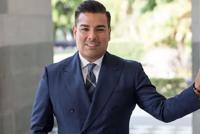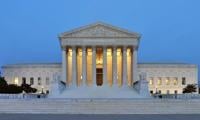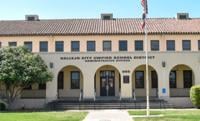
California 1st District Court of Appeal Justice Jeremy Goldman
A state appeals panel has ordered the University of California to again reconsider a policy of refusing to hire students who cannot document their immigration status, saying the threat of federal actions against the schools for employing illegal immigrants isn't enough to stop the university from following state law prohibiting discrimination against people over their "immigration status" in hiring.
Jeffry Umaña Muñoz and Iliana Perez said the state university regents are violating the Fair Employment and Housing Act and the California Code of Regulations through a policy prohibiting schools from hiring students who lack federal work authorization.
Justice Jeremy Goldman wrote the opinion for the California First District Appellate Court, filed Aug. 5; Justices Tracie Brown and Jon Streeter concurred.
According to Goldman, the Regents didn’t assert federal law required adopting the hiring rule but rather argued the policy doesn’t discriminate based on immigration status and, even if it were found to be so, the policy is supported by several reasons, including a risk assessment of potential enforcement action under the federal Immigration Reform and Control Act.
The Regents said thousands of undocumented students enroll at various UC campuses, but when the federal government stopped accepting enrollment to the Deferred Action for Childhood Arrivals (DACA) program in 2018, the result was a sharp decrease in the number of undocumented immigrant students who could secure temporary federal work authorization.
Although a working group formed in May 2023 to assess paid employment for students regardless of federal work authorization, members dissolved the group in January 2024 without changing policy. That led to state lawmakers passing a bill preventing all colleges in California from disqualifying students from working campus jobs if they failed to prove federal work authorization unless federal law requires such proof or if it is a condition of a grant funding a particular job.
“The bill also required these institutions to treat the prohibition on hiring undocumented students found in IRCA ‘as inapplicable because that provision does not apply to any branch of state government,’ ” Goldman wrote. “The governor vetoed the bill.”
The students filed their complaint that October, seeking a court order directing the Regents to abandon the policy. Although the panel initially denied that request, the California Supreme Court granted review and sent the case back to the First District, which asked the Regents to address questions about the legal basis for its policy and the relief the students sought.
Although the panel agreed there can be justification for making “a quasi-legislative policy decision based on” a risk assessment, it gave weight to the students’ position the policy is arbitrary, capricious and in conflict with state law.
“The university has not cited, nor have we found, any authority suggesting that the continued use of a policy that is unlawful under state law can be justified solely on a determination that discontinuing the policy might result in significant harm to the students and employees of the university based on perceived risks of potential federal law violations, even reasonable risks based on a careful assessment of what positions federal actors might take,” Goldman wrote.
While the Regents argued the hiring of DACA students shows the policy doesn’t discriminate against all students without documentation, the students countered by claiming a lack of federal authorization isn’t materially distinct from immigration status, and undocumented immigrants are a protected employment class under state law. The panel agreed, and said the university could only show the policy is lawful with “clear and convincing evidence” it’s required to remain compliant with federal immigration law.
Noting the Regents “expressly declined to take a position on whether IRCA applies to state government entities,” the panel explained how they failed to argue the ability to “continue to engage in an unlawful employment practice solely to avoid possible litigation over the practice’s lawfulness.”
The panel likewise said the Regents wrongly invoked FEHA’s “safe harbor” provisions, asserting the right to take actions motivated by desire to comply with federal directives, noting the lack of argument of explicit federal orders. Goldman also said the university didn’t cite “any authority suggesting that its employment policies are exempt from FEHA.”
Ultimately, Goldman said, the Regents insisted a decision against changing the policy against hiring undocumented students for campus jobs wasn’t based on federal laws or rules but “only on the risks associated with adopting a policy that the federal government might consider unlawful. We understand why the university does not want to offer an argument in support of what it believes will be the federal government’s interpretation of IRCA or the regulation, and we do not speculate about why it has so far decided against an effort to escape its predicament by seeking a declaratory judgment against the government. But a predicament it is: The policy is unlawful under FEHA unless federal law requires it, and neither the university nor anyone else has argued to us that it does. Without more, there is no basis for us to hold that the risk of federal prosecution alone justifies continuing it.”
As such, the panel ordered the Regents to reconsider university policy based on the proper criteria. However, it also noted the students “did not establish, as they asserted in their opening brief, that the university’s policy violates FEHA as a matter of law” and therefore the panel didn’t attempt to resolve that question. The panel also noted its decision preserves the Regents’ option of bringing its own declaratory judgement action in federal court.
The workers are represented by Altschuler Berzon, Organized Power In Numbers, the National Day Laborer Organizing Network and the UCLA School of Law Center for Immigration Law and Policy.
The Regents are represented by Munger, Tolles & Olson and the university’s general counsel.
Sidley Austin filed a support brief for the workers on behalf of four university professors. Several organized labor and educator associations did so as well.








